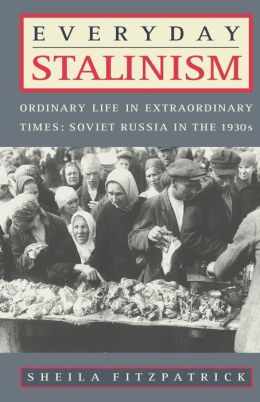I have just started reading Everyday Stalinism: Ordinary Life in Extraordinary Times: Soviet Russia in the 1930s by Sheila Fitzpatrick. I was struck by the authors suggestion that "people understand and remember their lives in terms of stories." She identifies the following stories that were central to Russian understanding and memory in the 1930s:
- The Radiant Future: that the future of the people of the USSR was certain to be radiant because of the historical processes of Marxism.
- Socialist Realism: artists should see life as it "was becoming" due to socialism, not as it might appear in the moment.
- Out of Backwardness: that Russian society was emerging into modernity out of the backwardness of pre-revolutionary monarchical institutions.
- If Tomorrow Brings War: that the USSR was momentarily safe, but that capitalist and reactionary forces threatened war in the future, and that current sacrifices were justified to prepare the homeland to survive and win such a war.
The point is that the stories may not turn out to be true, but nevertheless they are powerful at the time that they are operational.
What are the stories Americans tell ourselves?
- We are a nation in which "all men are created equal": over history, women were seldom if ever created equal, indentured servants often died in servitude, there was slavery, Indians were not equal, blacks were not equal, Asians were not equal, etc.
- We are the melting pot: except for blacks and Indians. Asians were excluded. Many now wish to keep Hispanics from melting into the American mix, etc.
- We symbolize (small d) democracy: except that only property holding men could vote in the early days of the Republic. It took almost two centuries to pass voting rights legislation, and up to the present day efforts are under way to exclude some people from voting. Influence over the government is tied up with money and lobbying rather than the voice of the people, bosses ran political machines, etc.
- This is a country of religious freedom: most of the original states had state religions and citizens were forced to tithe to support the ministers of the state church. There is a long history of extreme prejudice against some established religions -- Mormon, Catholic, Jewish, Muslim, etc.
- American exceptionalism: ("Most statements of "'American exceptionalism' presume that America's values, political system, and history are unique and worthy of universal admiration.") Could it be that we are not as virtuous as we think we are?: Certainly we are not universally admired for our virtue.
- Land of Opportunity: Not so much for the child of a single black mother or an American Indian mother on a reservation. A number of European nations are now estimated to have more socio-economic mobility than the United States.

No comments:
Post a Comment